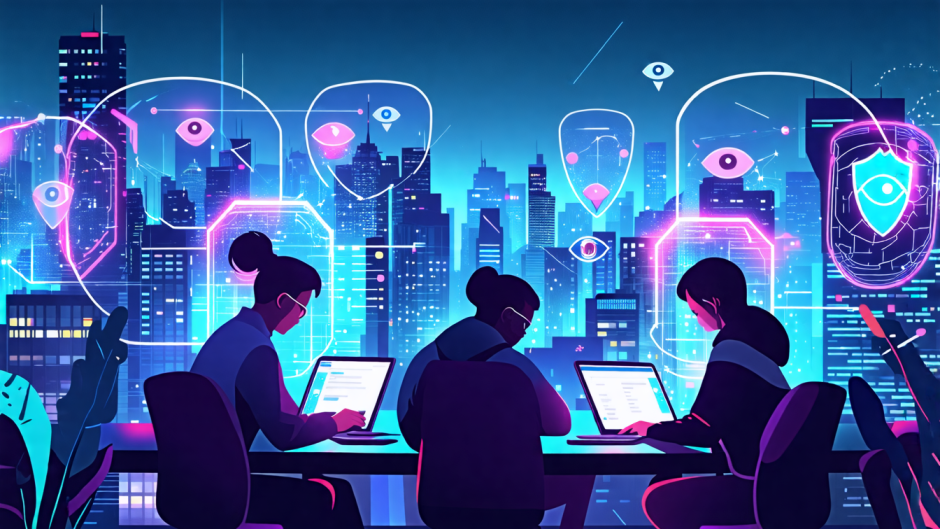Top 5 Best VPN Services for 2023
What Makes a VPN the Best in 2023?
In an era where digital privacy and security are paramount, finding the best VPN service can be a game-changer. Whether you’re a casual browser or a dedicated gamer, the right VPN can make a significant difference in your online experience. This guide will help you navigate the sea of VPN options available in 2023 by spotlighting the top five services that stand out for their impeccable performance, user-friendly interfaces, robust security protocols, and comprehensive privacy policies.
Understanding Key Features
When it comes to evaluating VPNs, several key features define the best from the rest. Speed is crucial—nobody wants to deal with buffering or slow load times while browsing or streaming. Security is equally essential, with advanced encryption standards and reliable security protocols safeguarding your data. User-friendliness cannot be overlooked either; a seamless setup process and intuitive interface make for a stress-free experience, especially for users who might not be tech-savvy.
Importance of Privacy and Anonymity
In 2023, the best VPNs prioritize user privacy and anonymity, employing stringent no-log policies and advanced encryption techniques. These factors ensure that your online activities remain confidential and that your data is protected from potential breaches. The top VPNs elevate their offerings by providing additional privacy features like Double VPN, which routes your traffic through two servers for added security.
Compatibility and Ease of Use
A top-tier VPN in 2023 must offer broad compatibility with various devices and platforms, from smartphones to laptops to smart TVs. Additionally, the best services come with dedicated apps and extensions that make it easy to secure all your devices with minimal hassle. Ease of setup and user interface play significant roles in making these tools accessible to all, regardless of technical expertise.
Keeping these factors in mind, we’ve curated a list of the top five VPN services that excel in 2023. Each of these VPNs offers a unique blend of speed, security, privacy, and usability, ensuring you can find the perfect match for your needs.
What Makes a VPN the Best in 2023?
Understanding Key Features
When determining what makes a VPN the best in 2023, several essential features come to the forefront. Speed, security, and user-friendliness are among the top criteria. Speed is crucial because a slow VPN can render your internet experience frustrating and inefficient. Top-tier VPN services leverage advanced server infrastructure and technologies like WireGuard protocols to ensure that speed doesn’t become a compromise.
Security is another critical component. In an era where cyber threats are becoming increasingly sophisticated, a VPN must provide robust security protocols. Look for VPNs that offer AES-256 encryption, a security standard adopted by governments and cybersecurity experts worldwide. Additionally, features such as a kill switch, DNS leak protection, and multi-factor authentication can fortify your online privacy.
User-friendliness must not be overlooked. A VPN might have the most advanced features, but if it’s challenging to navigate or set up, it won’t serve the average user well. The best VPN services in 2023 offer intuitive interfaces, easy installation processes, and comprehensive customer support to make your experience as seamless as possible.
Importance of Privacy and Anonymity
Privacy and anonymity have always been cornerstones of VPN usage, but their importance has escalated in recent years due to rising concerns about data harvesting and surveillance. The best VPNs feature stringent no-log policies, ensuring that your online activities remain confidential. Transparency is vital; reputable VPN services undergo regular audits by independent third-parties to verify their privacy claims.
Encryption standards play a significant role in maintaining privacy. Top-rated VPNs utilize cutting-edge encryption techniques to protect your data from prying eyes. This is especially crucial when using public Wi-Fi networks, which are notoriously vulnerable to cyber attacks. By encrypting your internet traffic, a VPN ensures that even if your data is intercepted, it remains unintelligible to unauthorized entities.
Additionally, advanced features such as MultiHop or Double VPN, where your data passes through multiple VPN servers before reaching its destination, can offer an extra layer of anonymity. This makes it exponentially harder for anyone to trace your online movements, effectively safeguarding your digital footprint.
Compatibility and Ease of Use
Compatibility across various devices and platforms is another hallmark of the best VPNs in 2023. In a multi-device world, users expect their VPN to seamlessly work across different operating systems like Windows, macOS, iOS, Android, and even Linux. Versatility extends to browser extensions and support for devices like smart TVs and gaming consoles.
Ease of use is integral to maintain a pleasant user experience. VPN providers achieve this through intuitive apps with user-friendly interfaces that don’t require a steep learning curve. Features like one-click connections, clearly labeled options, and helpful prompts can make all the difference to a user unfamiliar with VPN technology.
Furthermore, the best VPNs invest in stellar customer support. Whether it’s through live chat, email support, or comprehensive FAQs and tutorials, robust support systems ensure users can resolve issues promptly. This makes the VPN experience smooth and stress-free, enhancing overall satisfaction.
Comparison of the Top 5 Best VPN Services
The market is flooded with VPN services, each promising unparalleled speed, security, and privacy. In this section, we delve into the top 5 best VPN services for 2023. These options are curated based on their distinguishing features, user evaluations, and overall performance. Let’s explore what makes each of these VPNs stand out.
ExpressVPN
When it comes to reliable performance and robust security, ExpressVPN often tops the list. This VPN service is celebrated for its exceptional speed, utilizing advanced Lightway protocols that ensure a swift and stable connection. These protocols are not only faster but also more secure, providing an edge over many competitors.
ExpressVPN employs top-notch security measures, including AES-256 encryption, which is considered the gold standard in cybersecurity. The kill switch adds an extra layer of protection by automatically disconnecting from the internet if the VPN connection drops. This ensures that your IP address and sensitive information remain secure at all times.
Customer support is another area where ExpressVPN excels. Their 24/7 live chat support is highly responsive, providing immediate assistance with any issues or queries users might have. Coupled with a user-friendly interface and compatibility with a wide range of devices and platforms, ExpressVPN offers a seamless experience for both novice and advanced users.
NordVPN
NordVPN has carved out a niche for itself with unique features like Double VPN and CyberSec. Double VPN encrypts your traffic twice, offering an added layer of security, which is particularly valuable for users concerned about surveillance and censorship. CyberSec, on the other hand, blocks ads and malicious websites, enhancing not just privacy but also the overall browsing experience.
With more than 5,000 servers spread across 60 countries, NordVPN provides ample options for users seeking diverse IP addresses and fast connections. The ease of switching between servers ensures optimal speed and performance, making it ideal for activities like streaming and torrenting.
NordVPN also emphasizes strong privacy policies, strictly adhering to a no-logs policy. This means your online activities are not recorded, providing true anonymity. Their user-friendly apps are available for various platforms, ensuring you can secure any device you use.
CyberGhost
CyberGhost shines in its ability to offer specialized servers tailored for streaming and torrenting. This VPN service simplifies the process of accessing geo-restricted content on platforms like Netflix, Amazon Prime, and BBC iPlayer. Its dedicated servers for torrenting provide an optimized and secure environment for P2P file sharing.
Security is a significant focus for CyberGhost, utilizing AES-256 encryption and offering a strict no-logs policy. The inclusion of an automatic kill switch ensures that users’ data remains protected even when the VPN connection drops unexpectedly.
Another aspect that sets CyberGhost apart is its user-friendly interface, which is designed to cater to both beginners and seasoned users. With a single subscription covering up to seven simultaneous connections, CyberGhost offers excellent value for money, making it a popular choice among families and users with multiple devices.
Surfshark
Surfshark is known for its affordability without compromising on essential features and performance. One of its most attractive aspects is the ability to use the service on an unlimited number of devices with a single subscription. This is particularly appealing for households with multiple users.
The CleanWeb feature blocks ads, trackers, and malware, enhancing both security and user experience. Meanwhile, the MultiHop feature allows users to connect through multiple countries, providing an extra layer of obfuscation and enhancing privacy.
Despite its lower price point, Surfshark does not skimp on security, offering industry-standard AES-256 encryption and solid privacy policies. The VPN also includes a kill switch and is compatible with a wide range of platforms, ensuring all your devices are secure and protected.
Private Internet Access (PIA)
Private Internet Access (PIA) has gained a reputation for its strong privacy policies and extensive customization options. One of the key features of PIA is its transparency regarding data practices, including regular updates on any legal requests received and how they handle such requests.
PIA offers robust security with AES-256 encryption, various security protocols including OpenVPN and WireGuard, and an automatic kill switch. For those who like to fine-tune their VPN experience, PIA offers numerous settings that can be customized to suit individual needs, from encryption levels to connection types.
The extensive server network of PIA spans over 78 countries, ensuring fast and reliable connections. The VPN supports up to 10 simultaneous connections, making it an excellent option for users who need to secure multiple devices at once.
By highlighting the unique features and strengths of these top 5 VPN services, users are better equipped to make an informed choice that suits their specific needs. Whether it’s speed, security, privacy, or ease of use, each of these VPNs offers something valuable for those seeking the best VPN in 2023.
Choosing the Best VPN for Your Needs
Determining Your Priorities
When it comes to choosing the best VPN for your needs, the first step is to determine your priorities. Different users have different requirements, and understanding what you need out of a VPN will help you make an informed choice. Are you more concerned about security and privacy? Or is high-speed streaming your main focus? Perhaps budget constraints play a significant role in your decision-making process. Here are some key aspects to consider:
- Security and Privacy: If your top priority is securing your data and maintaining anonymity online, look for VPNs with robust encryption protocols, no-logs policies, and advanced security features.
- Streaming: For those interested in unblocking geo-restricted content and enjoying smooth streaming experiences, prioritize VPNs known for their high-speed servers and ability to bypass streaming service restrictions.
- Torrenting: If you frequently download large files, consider VPNs that support P2P file sharing and offer unlimited bandwidth and fast download speeds.
- Price Sensitivity: Budget-conscious users should look for affordable VPN options or those that offer the best value for money, keeping an eye out for discounts and long-term subscription deals.
- User Interface and Compatibility: Ensure that the VPN you choose is compatible with all your devices and offers an intuitive, user-friendly interface for easy setup and use.
Taking the time to evaluate these factors will help you narrow down your options and select a VPN that aligns with your specific needs.
Free vs. Paid VPNs
The debate between free and paid VPNs is ongoing, but understanding the differences can help you make a more educated decision. While free VPNs can be tempting, especially for budget-conscious users, they come with their own set of limitations and concerns.
Pros and Cons of Free VPNs
Pros:
- Cost Savings: The most apparent advantage of free VPNs is that they don’t require any financial investment, making them accessible to everyone.
- Basic Protection: Free VPNs offer basic encryption and some level of privacy, making them a decent choice for occasional use.
Cons:
- Limited Features: Free VPNs often have limited server options, bandwidth, and speeds, which can hinder performance and usability.
- Security Risks: Some free VPNs may log your data or serve ads, potentially compromising your privacy and security.
- Reliability: Free services may suffer from frequent downtimes and inconsistent performance.
Benefits of Paid VPNs
Investing in a premium VPN can offer significant advantages that outweigh the cost:
- Enhanced Security: Paid VPNs typically provide stronger encryption, advanced security features, and strict no-logs policies.
- Better Performance: With access to a wider range of high-speed servers, paid VPNs offer faster and more reliable connections.
- Comprehensive Features: Premium VPNs come with additional features like dedicated IP addresses, malware protection, and multi-device support.
- Customer Support: Paid services often include 24/7 customer support, ensuring that you can get help whenever you need it.
Ultimately, while free VPNs may suffice for occasional use, a paid VPN is generally a smarter investment for those who prioritize security, speed, and reliability.
User Reviews and Expert Recommendations
One of the best ways to gauge the quality and performance of a VPN is by considering user reviews and expert recommendations. Real user feedback provides insights into the day-to-day functionality and reliability of a VPN service, while expert analysis delves into the technical aspects and feature sets that may not be immediately apparent to regular users.
Importance of User Feedback: Reading user reviews on trusted platforms helps you understand common issues, performance levels, and overall satisfaction among the user base. Look for trends and recurring comments, both positive and negative, to get a balanced perspective.
Expert Analysis: Expert reviews offer in-depth evaluations of VPN services, assessing factors like security protocols, server speeds, compatibility, and value for money. These reviews often include performance tests and comparisons with other VPNs, providing valuable context for your decision.
Recommendations: Combine insights from user reviews and expert opinions to create a shortlist of VPNs that meet your criteria. Pay attention to both the strengths and weaknesses of each service and choose one that aligns most closely with your specific needs.
In conclusion, choosing the best VPN for your needs involves assessing your priorities, weighing the benefits of paid services over free ones, and consulting user and expert reviews. By taking a thorough and informed approach, you’ll be well-equipped to select a VPN that provides the security, performance, and features you require for a seamless online experience in 2023.
Conclusion
As the digital landscape continues to evolve, the importance of a reliable VPN cannot be overstated. The top five VPN services for 2023, as detailed in this article, each bring unique strengths to the table. Whether you’re looking for unparalleled speed with ExpressVPN, the robust security features of NordVPN, the specialized servers of CyberGhost, the affordability and innovativeness of Surfshark, or the strong privacy policies of Private Internet Access (PIA), there is a VPN service tailored to meet your specific needs.
When selecting a VPN, it is essential to prioritize what matters most to you—be it security, streaming capabilities, cost-effectiveness, or user-friendliness. Remember, while free VPNs might be tempting, investing in a premium service often provides superior security, better speeds, and more reliable performance.
Ultimately, the best VPN for you is one that aligns perfectly with your unique requirements. By evaluating your priorities, consulting user reviews, and considering expert recommendations, you can make an informed choice that will enhance your online privacy and security in 2023 and beyond.



